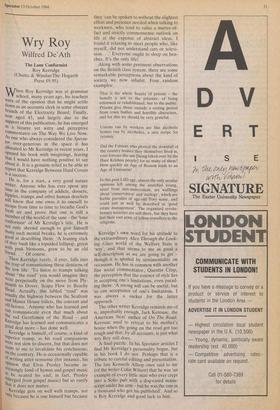Wry Roy
Wilfred De'Ath
The Lone Conformist Roy Kerridge (Chatto & Windus/The Hogarth Press £9.95) 'Then Roy Kerridge was at grammar
school, many years ago, his teachers were of the opinion that he might settle down as an accounts clerk in some obscure branch of the Electricity Board. Finally, now aged 43, and largely due to the support of this publication, he has emerged as a bizarre yet witty and perceptive commentator on The Way We Live Now. As one who always considered the Specta- tor over-generous in the space it has allocated to Mr Kerridge in recent years, I oPened his book with misgivings, fearing that I would have nothing positive to say about it. It is a genuine relief to be able to report that Kerridge Between Hard Covers IS a success.
He is, for a start, a very good nature writer. Anyone who has ever spent any time in the company of addicts, dossers, hiPPies, tramps and other human derelicts Will know that one owes it to oneself to escape from time to time to breathe God's fresh air and prove that one is still a Member of the world of the sane — the 'lone conformist' of Mr Kerridge's title. He is not only shrewd enough to give himself many such mental breaks, he is extremely good at describing them: 'A leaning stick of may bush like a lopsided lollipop, green with pink blossoms, grew to be an old iriend. .' Of course.
Then Kerridge rarely, if ever, falls into the trap of romanticising these denizens of the low life: 'To listen to tramps talking about "the road" you would imagine they were perpetually on the move from Ply- °uth to Dover, Scapa Flow to Beachy rlead. Actually, this fabled "road" was usually the highway between the Seafront 4nd Manor House toilets, the convent and °f-licence.' Anyone who has learned and ca,,u communicate even that much about 'ne sad Gentlemen of the Road — and kerridge has learned and communicates a good deal more — has done well.
Kerridge is himself, of course, a kind of superior tramp, as his road companions Were not slow to discern,.but that does not seem to me to invalidate his conclusions; '311 the contrary. He is occasionally capable °I. writing utter nonsense (for instance, his °Pinion that Elvis Presley became in- creasingly fond of hymns and gospel music as he neared his end; in fact, Presley eMerged from gospel music) but so rarely that it does not matter.
Kerridge gets on well with tramps, not °ItlY because he is one himself but because
they 'can be spoken to without the slightest effort and pretence needed when talking to workmen, who tend to value a matter-of- fact and strictly commonsense outlook on life at the expense of abstract ideas. I found it relaxing to meet people who, like myself, did not understand cars or televi- sion. . .' Everyone ought to sleep on ben- ches. It's the only life!
Along with some pertinent observations on the British class system, there are some remarkable perceptions about the kind of society we now inhabit. Four random examples:
That is the whole beauty of prisons — the benefit is not to the prisoner, of being reformed or rehabilitated, but to the public. Prisons give those outside a resting period from town bullies and horrible characters, and for this we should be very grateful.
Unions run by workers are like alcoholic homes run by alcoholics, a sure recipe for tyranny.
Did the Fabians who plotted the downfall of the country houses they themselves lived in, ever foresee this use [being taken over by the Hare Krishna people] for so many of them? How quickly an Age of Reason leads to an Age of Unreason!
In this post-LSD age, almost the only secular opinions left among the anarchist young, apart from anti-materialism, are wafflings about 'conservation' and 'ecology', which are feeble parodies of age-old Tory sense, and could just as well be described as 'good estate management'. The organised revolu- tionary societies are still there, but they have lost their vast army of fellow-travellers to the religions.
Kerridge's own word for his attitude to the extraordinary Alice Through the Look- ing Glass world of the Welfare State is 'wry', and that seems to me as good a self-descriPtion as we are going to get — though it is spoiled by sentimentality on occasions. He has in common with another fine social commentator, Quentin Crisp, the perception that the essence of style lies in accepting one's limitations, even parad- ing them: 'A strong will can be useful, but so can acceptance of one's limitations. I was always a sucker for the latter approach.' The other writer Kerridge reminds me of is, improbably enough, Jack Kerouac, the American 'beat' author of On The Road. Kerouac used to retreat to his mother's house when the going on the road got too rough and that, by all accounts, is just what wry Roy still does.
A final puzzle. In his Spectator articles I find Mr Kerridge's personality bogus, but in his book I do not. Perhaps that is a tribute to careful editing and presentation. The late Kenneth Allsop once said to me (of the writer Colin Wilson) that he was 'an example of every little man who ever crept into a Soho pub with a dog-eared manu- script under his arm — but he was the one in a thousand who got his published'. And so is Roy Kerridge and good luck to him.






















































 Previous page
Previous page